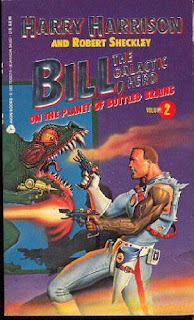2013; 329 pages. Book 5 (out of 28) in the “Dev Haskell – Private Investigator” series. New Author? : No. Genres: Pulp Thriller; Hard-Boiled Mystery; Private
Investigator Mystery. Overall Rating: 8*/10.
For Private Investigator Dev Haskell, the
assignment is a dream job.
First of all, his client is
his attorney and drinking buddy, Louie Laufen.
It’s good to know the background of the person who’s hiring you.
Even better is the job itself:
just go down to a local nightclub called the Tutti Frutti, sip some suds, and
see if you can detect some illegal gambling going on. Even if you don’t notice anything amiss, you
get to come back and collect your fee. So down to the club goes Dev.
He doesn't see any sign of gambling, but one thing quickly catches his eye. Everyone at the club –
customers and workers alike – seems to be slap-happy, using a spank on the butt in
place of a handshake or a hug. Dev finds that kind of weird, but hey, to each his own, and
maybe they’re foreigners of some sort. Such as Canadians. Or Texans.
Oh well, enjoy your drink, Dev. If you think the butt-slapping is strange,
wait till you see the floorshow.
What’s To Like...
Tutti Frutti
is Book 5 in Mike Faricy’s always-entertaining pulp thriller “Dev Haskell - Private Investigator” series and follows the usual
formula: Dev’s “easy” job rapidly spins out of control, the women he hits on
often have ulterior motives for tolerating his advances, crimes get committed,
and somehow the police conclude Dev’s the most likely perpetrator.
There's a plethora of plotlines. In addition to the illegal gambling probe, Dev has murders to solve, mobsters to be wary of, flower deliveries of
undetermined origin and motive to backtrack, and, most important of all, embarrassing photos
of himself in compromising positions to explain, pics that he has no recollection posing for and which are now being spread around to the worst possible associates of Dev: his bedmates and
the cops.
The story is set in St. Paul
Minnesota and told from a first-person point-of-view. The chapters are short, with 60 of them covering
329 pages. I enjoyed tagging along with Dev
as he muddles along, trying in vain to make sense of the mayhem, and
although you can read this as a “whodunit”, I found it more fun to try to anticipate
the steps Dev was taking to solve the mysteries and clear his name.
Everything builds to a suitably
exciting ending that included a couple of neat twists that I didn’t see
coming, especially a clever evasive resource if you ever have to wear an ankle
monitor as part of your plea deal agreement. The final chapter was a neat little epilogue that I really enjoyed.
Tutti Frutti is a
standalone novel as well as part of a 28-book series. I’m reading the books in order, but frankly,
I don’t think that’s necessary.
Ratings…
Amazon:
3.7/5
based on 440 ratings and 371 reviews.
Goodreads: 3.61/5 based on 758
ratings and 63 reviews
Excerpts...
My phone rang. It was Heidi’s number. Probably calling to apologize now that she’d
calmed down a bit. I could understand
her being upset, but I was glad she’d seen the light.
“Hi, Heidi, are we feeling a little better,
dear?”
“Shut up you slimy piece of toilet
scum. I just want you to listen to
this,” she screamed. (loc. 16128)
“And so your car got to her house how?”
“I have no idea. I have no memory of leaving her house. The last thing I remember is her wearing a
smile and a pair of these black knee high boots. Kinda sexy,” I glanced at humorless Clara,
but she remained focused on her notebook.
“Candi gave me a drink. I don’t
know what the drink was. I just know
that it burned when it went down. I
remember that. Oh, and she got the stuff
in Mexico.”
“Tequila?”
“I don’t know what it was.”
“Are you in the habit of drinking drinks
that you don’t know what they are?”
“Sometimes.” (loc. 17164)
Kindle Details…
Tutti
Frutti is priced at $3.99 at Amazon, as are all the
other books in this series. You can also pick up the entire series in various 5- or 7-book bundles, which are all priced
at $9.99. Mike Faricy also offers a couple novellas in the same setting for $0.99
apiece. He has at least two other series: Jack Dillon Dublin Tales and Hotshot, neither of which I have tried yet; the books in those cost $2.99-$3.99.
“Hello, Biker? Woof, woof, woof, grrrr.” (loc. 14315)
The usual quibbles about this
series apply to Tutti Frutti as well. The biggest problem is the abundance of
typos. I noted a couple dozen of them,
almost all of them “spellchecker errors”.
Some of the ones that made me chuckle were: sexist/sexiest,
phased/fazed, psyche/psych, and my favorite, statute-like/statue-like. Compound words, such as shot gun/shotgun, after thought/afterthought,
and here by/hereby also plagued the
text.
It turns out the Tutti Frutti Club is a “bondage-dom”
establishment, and
this seemed to offend some reviewers. Others
thought there was too much booze-drinking and "rolling-in-the-hay", but I disagree. These are hard-boiled mysteries, not cozies, although if you’re looking for a Fifty Shades of Grey
tale, you’re going to be very disappointed.
Admittedly, there is a fair amount of cussing (15 instances in the first 10%) and lots of spanking, but
even the latter was almost (but not quite)
always done as a greeting between clothed individuals.
8 Stars. I’m five books through this series, and have yet to be bored by any of them. The pacing is brisk, and there’s plenty of action, wit, and in Dev’s case, self-deprecating humor. The character development is great, and I was happy to see Louie playing a greater role here. The plot structure may be formulaic, but so what? I like Mike Faricy’s formula.





